|
The Great War
News Reports From the Front
100 Years Ago This Month
March 1917
Dismemberment of America Proposed, Russia Disposes the Czar
March 2
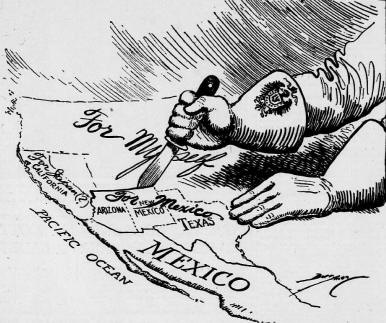 Revelations of how Germany, expecting war with the United States as a result of her campaign of unrestricted submarine warfare, plotted to unite Mexico and Japan with her for an attack on the United States has stirred the capital to its depths. Revelations of how Germany, expecting war with the United States as a result of her campaign of unrestricted submarine warfare, plotted to unite Mexico and Japan with her for an attack on the United States has stirred the capital to its depths.
Members of Congress, many of whom have been hesitating over President Wilson's request for full authority to deal with Germany in the present situation, went to the Capitol today. They read documented evidence of the intrigue which was proposed to separate Japan from the Allies, and added the United States to the list of
nations which Germany hopes to see conquered in her dream of world domination.
How Germany, confident that unrestricted submarine warfare is the instrument by which she will bring England to her knees, proposed a triple blow, is revealed in a set of instructions from German Foreign Minister Zimmerman to the German Ambassador in Mexico City.
Germany proposed to weaken the Allied alliance by the defection of Japan, striking a crushing blow at England's naval power by cutting off the vital supply of Mexican fuel oil, and thoroughly engaged the attention of the United States by an invasion, in which Japan was to be invited to join, and for which Mexico should be
rewarded by re-conquering her lost "provinces" - Texas, New Mexico and Arizona.
This document dated, January 19, shows plainly that Germany, while making repeated protestations to the United States that she had no intention of resuming unrestricted submarine warfare, was making the final arrangements for its execution two weeks before it was announced.
The text of this document is as follows:
"Berlin, January 19, on 1 February we intend to begin severing warfare unrestricted. In spite of this, it is our intention to keep neutral with the United States of America.
If this attempt is not successful, we propose an alliance on the following basis with Mexico: that we shall make war together and together make peace. We shall give general financial support, and it is understood that Mexico is to re-conquer her lost territory in New Mexico, Texas and Arizona. The details are left to you for
settlement.
You are instructed to inform the President of Mexico of the above in the greatest of confidence as soon as it is certain that there will be an outbreak of war with the United States and suggest that the President of Mexico, on his own initiative, should communicate with Japan suggesting adherence at once to this plan, at the
same time, offer to mediate between Germany and Japan.
Please call to the attention of the President of Mexico that the employment of ruthless submarine warfare now promises to compel England to make peace in a few months." Signed Zimmerman
Aside from the plan to alienate Japan from the allies and turn that country against the United States, the plot to embroil Mexico in a war against the United States commands chief attention because it is regarded as proof of long smoldering suspicion of German activities to stir up trouble elsewhere in the Western Hemisphere,
where the United States, by the Monroe doctrine, is morally obligated to maintain order.
The London Standard says: "The United States is only experiencing a little of what Great Britain suffered during a period of profound peace. Germany worked long and assiduously to format trouble in India, in South Africa, in Persia, in Afghanistan, in North Africa, while Germany rolled British opinion into unsuspecting
rapport. This attempt to mobilize Japan and Mexico against America while protesting friendship is too Judas-like to be forgotten by the straightforward people like Americans."
The German attempt to embroil Mexico and Japan into war against America adds another chapter to the celebrated report of Jules Combon, the French ambassador in Berlin before the war. The report tells of Germany's worldwide plans for stirring strife on every continent where they might aid her in the struggle for world
domination, which she dreamed was so close at hand.
The authenticity of the "Zimmerman Note," was voucher for by the President in the Secretary of State last night in a reply to Senate resolution asking information regarding the source of the note. However, neither President nor the Secretary of State was willing to state categorically how they obtained the note.
The Senate resolution, asking for the source of the note, came at the close of the day of solemn debate, which reached a climax with Republican senators, joining Democrats in condemning Sen. Stone, Chairman of the Foreign Relations Committee, who declared the story of the plot was given out by the government to affect public
opinion and insisted upon asking the President whether the information was received from the representatives of any of the allied belligerent nations. Sen. Stone said he'd been told by a newspaperman that the note had been handed to the American government by the British government.
March 9
Congress is expected soon to take the final steps toward giving President Wilson the authority to arm American merchant ships for defense against submarines. The Navy Department is ready with guns and gunners to carry out the President's orders. Despite the extended discussion, little real opposition to the measure was
expressed. A number of senators declared they believe the arming of merchant ships would lead to war, but said they were willing to accept such a result.
German Foreign Minister Zimmerman, in response to a question from a reporter on his note to his Mexican Ambassador said: "Germany expects and wishes to remain on terms of friendship with the United States, but we have prepared measures of defense in case the United States declared war against Germany. My note only implies that
we would use means universally admitted in case the United States declared war. The whole note falls flat to the ground in case the United States does not declare war against us. America, from the beginning of the war, really participated in it by putting the immense resources of the United States at the Allies disposal, and that America has not
declared war only because they felt sure that the assistance by friendly neutrality, would be touring that time much more efficient for the Allies and direct participation in the war."
Zimmerman's frank admission that Germany sought to ally Japan and Mexico with her to war against the United States caused no surprise to American officials, although it may be said they did not expect so full and free an acknowledgment of the exposures. Some officials have, for there might be an attempt to discredit the
authenticity of the revelations by offering an explanation of the different character. American officials never had the least doubt of the authenticity of the evidence in their hands.
One Swiss newspaper, questioning on the manner in which Secretary Zimmerman hoped to reach the Mexican president, said: "he should have been able to spare at least one submarine and sent an emissary in it to Mexico to make the proposition verbally. When one does such things one never lets oneself get caught."
Meanwhile, the Japanese government issued a formal reply to the German note. In its statement it said "we were greatly surprised to hear of the German proposal, we cannot imagine what Germany was thinking about to convince that she could possibly involve us in a war with the United States. This is too ridiculous for words."
Needless to say, Japan remains faithful to her allies.
Following the receipt of a note from Austria, declaring she should agree to the German principle of unrestricted submarine warfare, the officials in Washington hold out little, if any hope, that a break between the United States and the Austrian government may be avoided. A break with Austria would probably be followed by a
break with Bulgaria and Turkey.
March 16
President Orders Merchant Ships Armed
On Saturday, President Wilson issued an executive order for guns to be placed aboard American merchant ships immediately, and they will be sent to sea under orders to fire on German submarines which attacked them. Navy Yards were ordered to equip the vessels as fast as possible.
The action will put the United States in the position of armed neutrality, the next step beyond the severance of diplomatic relations with Germany, and possibly a preliminary for war.
With the departure of the first armed American ships it was necessary for the Navy Department to issue instructions to gun crews as to the manner in which the weapons are to be employed.
The mere appearance of a German submarine or its periscope in the presence of an American merchant vessel would entitle that ship, according to the State Department's opinion, to take all measures of protection on the presumption that the U-boat's purpose was hostile. Under this ruling an American armed merchant could fire on
a German submarine the moment it was cited, without being considered as taking aggressive actions. This view is based on Germany's declared intention to sink within certain zones all vessels, neutral as well as belligerent, and whether passenger vessels, freighters are contraband carriers.
Fraught with the gravest possibilities of war with Germany, in case there is armed contact between American merchantmen and German submarines, President Wilson's decision to proceed in arming American guzzles was taken only after he had been officially advised by the Attorney General and the Secretary of State that he had such
rights, and only after he was convinced that Germany actually is proceeding with their campaign, unrestricted submarine warfare, and had made efforts to plot with Mexico and Japan against the territorial integrity of the United States.
Emperor Nicolas II abdicates as Czar of Russia
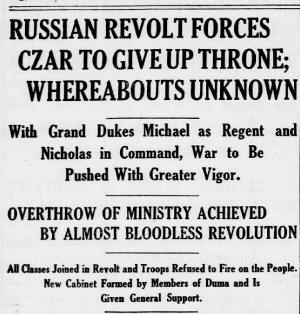 On Thursday, Nicholas II, Emperor of Russia abdicated, and grand Duke Michael Alexandrovitch, his younger brother, has been selected as regent. The Russian ministry, charged with corruption and incompetence, has been swept out of office. The
ministers, as well as the president of the Imperial Council are under arrest. On Thursday, Nicholas II, Emperor of Russia abdicated, and grand Duke Michael Alexandrovitch, his younger brother, has been selected as regent. The Russian ministry, charged with corruption and incompetence, has been swept out of office. The
ministers, as well as the president of the Imperial Council are under arrest.
A new national Cabinet was announced, with Prince Lvoff as president of the Council and Premier, and the other offices held by the men were close to the Russian people. The Council nobility already has held special meetings in 15 provinces and endorsed the new revolutionary government.
The abdication of the Czar came as a result of a successful revolution led by the Duma, word of which was first received yesterday. According to an Russian report: "The population of Petrograd, excited by the complete disorganization of the transportation services and food shortages, had for a long time been restless. The
population holds the government responsible for all its sufferings. The government, expecting trouble, took measures on a large scale in order to maintain order, and ordered dissolution of the Duma."
However, on March 11, the Duma decided not to accept the Imperial dictate, but to continue its meetings. The Duma immediately instituted an executive committee, presided over by the president of the Duma. That committee declared itself to be a provisional government that issued the following appeal:
"Considering the difficulties in regard to domestic tranquility, which are due to the policy of the former government, the executive committee of the Duma feels compelled to take public order in its own hands. Fully conscious of the responsibility arising in this decision, the committee expresses the certainty that the
population and the Army will lend assistance for the difficult task of creating a new government which will set the wishes of the people and enjoy their confidence."
The executive committee rested itself upon the population of the capital, which was in full revolution, and upon the army, completely united with the revolutionaries. They arrested all the ministers of the former government and sent them to jail. The Duma declared that the ministerial cabinet no longer existed.
Of the complete success of the revolutionary movement, in which the lead was taken by the Duma, there appears no doubt. Such news has been received, and indicates that the military, together with all the popular forces of the Empire, is backing the new government. The civil forces of the nation are cooperating with the
government most heartily in restoring normality in the life of the empire. That revolution means more vigorous prosecution of the war, and is adept blow to Germany's hopes of a separate peace with Russia, is universally accepted as a fact.
The old regime of conservatives has been supplanted by a government of liberals. Alexander Kerenski, the new Minister of Justice, is a socialist. He accepted the portfolio on the stipulation that there should be absolute freedom of speech and of the press in full political amnesty.
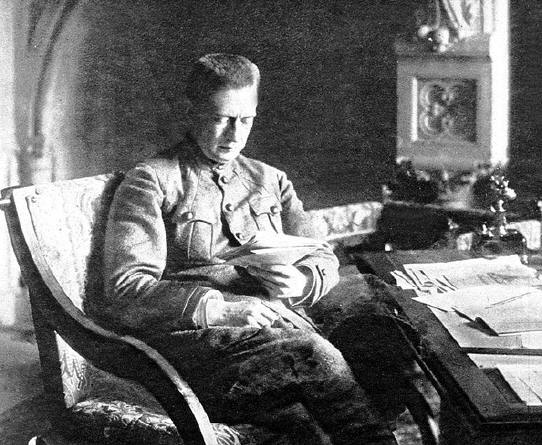
His name is now relegated to the dustbin of history, but had Alexander Kerenski been
successful, the world as we know it today would not exist. WWI would still be the
Great World War, not the first of two. The second world war and the Cold War would most
likely have never happened, and the Soviet Union may not have been created. Europe, or
for that matter, the world, would bear little resemblance to today’s world. Kerensky’s
insistence on remaining in World War I, his failure to deal with urgent economic problems (particularly land distribution) and his moderation enabled the Bolsheviks to overthrow his government later in 1917, after which the Soviet Union was formed.
The overthrow of the Russian aristocracy was accepted here as a victory for the anti-German sentiment in the empire, removing virtually all chances of Russia being drawn away from our allies into separate peace.
From the earliest Russian military reverses the German press has been filled with rumors and predictions of a separate piece in Russia worked out by those in the aristocracy who believe that Russia's destiny lay with Germany and not against her.
The Russian Revolution is commented upon editorial in here with enthusiasm, making a great triumph for the Allies and the great disaster for the Central Powers. The press describes it as the death of German hopes and more crushing and a more far-reaching blow Germany has yet received. The liberal papers also welcome it is a
triumph of democracy, presaging great influence on the cause of liberty throughout the world.
British Capture Baghdad
On Monday, Gen. Frederick Maude, commander of the Allied forces in Mesopotamia, telegraph the welcome news that British troops had occupied the city of Baghdad, the chief Turkish city and Mesopotamia, and formerly the capital of the empire of the Caliphs. The occupation was affected without resistance, and with only slight
losses.
The fall of Baghdad, in the opinion of the London press, is of even greater significance for the effect that it is expected to have on Germany aims them for the value in restoring British prestige in the eyes of the Mohammed’s. British misfortunes in Mesopotamia have been serious influences on the prestige of the British power
in India and Egypt, and claims that the capture of Baghdad will restore the balance.
The chief gratification expressed is that the success of the British expedition has shattered the dreams that Germany has indulged in for more than twenty years. The German proud vision of the Eastern Empire is dissipated before their eyes, the German route to the East is blocked and the existing terminus of their Berlin to
Baghdad railroad has passed into British hands.
The British advance in Mesopotamia, which has covered more ground in a shorter period than almost any other movement of the war, has been assisted by extensive defections of the native tribes from Turkish rule. Turkish troops are being menaced not only by British, but by strong forces of Arabs, organized by the British, who
are harassing the fleeing Turks.

Thomas Edward Lawrence was a British author, archaeologist, military
officer and diplomat. Stationed in Egypt, in 1916 he was sent to Arabia
on an intelligence mission and quickly became involved with the
Arab Revolt. Working closely with Emir Faisal, a leader of the revolt, he
participated in military activities against the Ottoman army. His
ability to vividly describe the events taking place during the Arab
uprising earned him international fame as “Lawrence of Arabia”
—a title used for the 1962 film based on his wartime activities.
Grand Sharif of Mecca, several months ago, declared independence of Ottoman rule; various Bedouin tribes have put aside year old enmities and united. Peace has been made between the Emir Arab Ag Roweih from near Damascus, and Hakim Ibn Mahid Hakim of the great Enzeh tribe, in the vicinity of Aleppo. These two powerful tribes
have agreed to assemble a troop of horsemen to fight the Turks and issued a proclamation to their followers calling for men and equipment. In preparation for actual warfare, they were supplied by the British, who affected the organization of an Arab fighting unit.
The example of these two Emirs has been followed by the lesser tribes, which are extending the movement from the borders of Syria to Persia. The promoters of Arab union are anxious to light the fire of rebellion in Iraq between the Euphrates and the Tigris.
It is also asserted that the great and powerful Sheik Khazal Khan has sent a deputation to the Sherif Suleimun I, King of the Hejaz - announcing his cooperation and submission as well as his readiness to respond to a call for men and money. It is believed that an offensive and defensive treaty has been made between him and the
Emir of Kuseit.
March 23
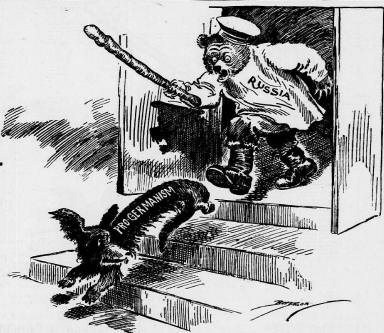 There are somewhat conflicting reports coming out of Russia regarding the fate of the Romanov dynasty. Dispatches on Saturday announced that Grand Duke Michael has accepted the throne from his brother, Nicholas II, subject to the consent of the Russian people
expressed through plebiscite. There are somewhat conflicting reports coming out of Russia regarding the fate of the Romanov dynasty. Dispatches on Saturday announced that Grand Duke Michael has accepted the throne from his brother, Nicholas II, subject to the consent of the Russian people
expressed through plebiscite.
In accepting the offer to assume his brother’s throne, the grand Duke issued the following memorandum: "This heavy responsibility has come to me at the voluntary request of my brother, who has transferred the Imperial throne to me during a period of warfare which is accompanied with unprecedented popular disturbances. Moved by
the thought which is in the minds of the entire people, that the good of the country is paramount, I have adopted the firm resolution to accept the supreme power only if this is in the will of our great people, who, by a plebiscite organized by their representatives in a constitutional assembly, shall establish a form of government and new
fundamental laws for the Russian state. Consequently, I urge all citizens of Russia to submit to the provisional government established upon the initiative of the Duma and invested with full plenary power, until such time, which will follow with as little delay as possible, as the Constitutional assembly, on the basis of universal, direct, equal and
secret suffrage, shell, by its decision as to the new form of government, expressed the will of the people."
As early as two months ago, rumors became current that the emperor would be forced to surrender his throne. The prevalence of rumors of court scandals and intrigues and the existence of mysterious channels, which seemed to run from court circles into the camp of the enemy, contributed to bringing the family into complete
disfavor. Whether these were true or not, it was felt that the weakness of the ruling family and allowing persons to direct the affairs of the country who were secretly designing against the best interest of the nation and apparently doing all possible to interfere with the proper conduct of the war, unfitted them to govern the country.
So swiftly, unexpectedly and completely did the great change come that the people are almost scarcely able to understand which has occurred. Injured through centuries to the grinding oppressiveness of aristocrat rule, the people regarded freedom as a glorious dream, which would forever remain a dream. The people seem disposed
to regard their liberation, at most, merely a temporary reprieve which must soon give way to the ancient law of Imperial will.
Nicholas Romanoff, as the former Emperor now is designated, left with his staff today for his personal estate on the southern coast of the Crimea. It is understood he will be permitted to live in retirement at his villa in the Crimea, far removed from the capital and the scenes of military operations. The general policy of the
new government is opposed to any acts of vengeance against persons connected with the old regime. While it has been recognized that if Nicholas could obtain a following and were disposed to combat the new government, civil war might result, there has been no indication that he contemplated such a move or could obtain the necessary support.
Accounts of his last hour as ruler depict him as resigned to his fate and determined not to stand against the wishes of the people. Nothing has been heard, however, in regard to the attitude of the former empress, a German, whose powerful influences at the Russian court is said to have been exerted against all Democratic
tendencies.
It is believed that the new Russian government will be in the form of a Republican government, not under a President, but under commission similar to the government of Switzerland. If this becomes an eventuality it is not unlikely that the present cabinet, containing the most popular leaders in the country, will form the
commission that will govern the country.
In any event the old regime is dead, the foreign office today informed the Associated Press, and nothing can resurrect it. If the people decide upon a monarchy it will be a monarchy of the most limited type, and the monarch will be stripped of all traditional powers which belong to the Emperor, and he will be little more than
ruler in name.
The Petrograd press, no longer under the strict censorship of the old regime, is taking advantage of its new liberty to publish facts heretofore suppressed in regard to the assassination of Gregory Rasputin, the mystic, whose influence in court circles stirred the country. While the whole nation was breathing a sigh of relief
at the deliverance from Rasputin's maligned influence, the Imperial family was laying away his remains, with great reverence and pump in the Royal Borough.
After Rasputin’s body was found, it was taken in an imperial car, in which rode the then Minister of the Interior. The body was taken directly to the imperial powers. The funeral ceremony was held in the imperial church. A silver coffin, containing the body, was carried to its resting place by the Emperor’s key ministers of
his government, and the head of the Russian army, followed by the Emperors in deep mourning. The affair caused a great scandal at the time and further inflamed the people against the Empress.
President Calls Congress To Session
On Wednesday, President Wilson, recognizing that Germany practically is making war on the United States on the seas, called Congress to assemble in an extraordinary session on April 2 to deal with the situation.
While all of official Washington acknowledges that a state of war practically exists between the United States and Germany, there is a wide range of speculation on the precise action President Wilson contemplates. The issuance of a proclamation of President Wilson that a state of war exists between the United States and
Germany is discussed among the possibilities.
Meanwhile, the government is preparing forceful actions to carry out the policy of armed neutrality, clear transatlantic steamship lines of German submarines, and protecting the U.S. coasts.
60 submarine chasers, 110 foot speedy craft, were ordered from the New York Navy Yard, to be completed in about two months, and bids for 200 more will be opened by the Navy Department. The New Orleans Navy Yard also is directed to build for chasers at once. The Naval Academy was ordered to graduate the Senior Class in March,
and the Junior Class in September, so that 374 more junior officers may be available speedily.
Informal negotiations will be started for an agreement with the British and French patrol squadrons now endeavoring to protect ships passing through the German submarine zone. This plan to make America more safe against submarines for all ships with the understanding that American ships will receive full protection in the
zones patrolled by the Allies.
All the allied nations openly gave indications of their belief that the United States soon will be involved in the war. Dispatches from abroad declared that the German government expects a state of war within the next 48 hours when the first American armed ship reached the war zone.
The ruthless destruction of one of them unquestionably would be an act of war. On the other hand, the sinking of a German submarine by one of the armed merchantmen probably would be met as an act of war by Germany.
March 30
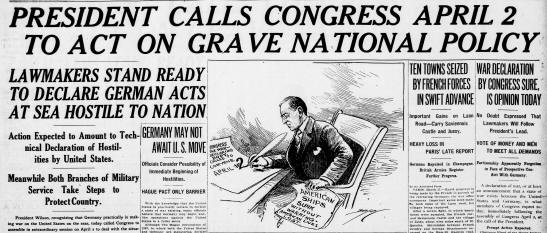
President Wilson has taken steps to place a nation or a war footing and additional moves are being announced hour by hour.
Every step possible for the United States government to take, in preparation for actual war with Germany, is being taken in the most decisive, rapid and complete manner. When the cabinet adjourned, late Saturday afternoon, it was discovered that one of the most important subjects under discussion was the mobilization of
skilled labor, so that munitions factories in the United States may be supplied with artisans in sufficient numbers, if necessary, to keep them running on a 24-hour day basis.
Likewise, it was learned that the cabinet discussed the possibility of assisting the Allies in connection with the huge loan, the figures ranging from $1 billion - $5 billion.
By Executive Order, the President has directed that the Navy be recruited without delay to full-authorized war strength of 87,000 listed men. Taken in connection with submarines already ordered, that means that the President has exercised the full limit of his legal powers as Commander-in-Chief to prepare the Navy for war.
Orders were placed by the Navy Department today with the American Steel and Wire Company for the media construction of 100 steel rope submarine nets. The Nets will cost $1,881 each and will be 1,000 feet long, 30 feet wide with a twelve-foot mesh. Deliveries will begin within three weeks and continue at a rate of ten a week
thereafter.
For the Army, the President directed that two new military departments be created on the Atlantic Coast region. This order means that the task of organizing the army for Congress to authorize would be divided among six departmental commanders instead of four, in the interest of speed and efficiency immobilization.
Temporary embargo on telephone service extensions throughout the country was ordered to be put on hold to reserve facilities that may be needed by the government should be it necessary for war.
President Wilson still has an open mind as to his recommendation for Congress when they meet next Monday in extraordinary session to deal with a ruthless summary warfare being waged by Germany against American lives and American shipping.
There are three courses under consideration for action by Congress. These are: first, a resolution supporting the armed neutrality policy of the government, endorsing everything Pres. Wilson has ordered or done in the way of preparedness and devoting a large cache sum for the conduct of war were Germany and case for war
results; second, a resolution declaring that a state of war exists between Germany and the United States; and third, a resolution declaring war against Germany for its ruthless acts against American lives and shipping in contravention of walls and the protest of the United States.
Which of these courses will be recommended by the President to Congress there is no way of knowing, but indications are that the President will ask Congress next Thursday to declare that a state of war exists between Germany and the United States.
No one pretends to speak for the President in such a grave issue as that which now faces the country. However, the march of events brings to the President’s advisors the realization that the United States government must take, sooner or later, official recognition of the fact that Germany is making war on American lives and
American shipping, and many of his advisors believed, at the time, to recognize that fact and to act upon it, has come at last.
One of the most interesting developments today was a conference Sen. Hastings of Wisconsin had with President Wilson. Sen. Hastings told the President that the pro-Germanization and the pacification that has existed to a large extent in Wisconsin, larger because of the German population in that state, are rapidly disappearing.
He informed the President, it is understood, that a number of loyal meetings have been taking place in Milwaukee and other German centers in Wisconsin, where the results that thousands of Germans are manifesting their support of United States government at this time. There is no question where Wisconsin will stand in the present international
situation, Sen. Hustings said.
It is understood that the Senator told the President that since the publication of the Zimmerman note, in which we showed that Germany tried to embroil the United States, Mexico and Japan, the residents of Wisconsin have, to a large extent, abandoned party lines and racial ties in favor of the President.
Meanwhile, in Russia, the Grand Dukes and the royal princes, in a joint telegraph addressed to the provisional government, not only formally associated themselves with the abdication of the Grand Duke Michael, but also turned over to the new revolutionary government all their official wealth, namely their buildings on Crown
lands and other state grants heretofore attached to their station.
The Russian revolutionary government appealed to the workmen of the German and Austrian coalition to rise against imperial authority and to establish there. The appeal was directed to the proletariat of the world, but especially designated the Central Powers, urging the workmen of those countries to throw off the yoke of
aristocratic rule as the Russian people have overthrown the Imperial aristocrats and refuse to serve any longer as an instrument in the hands of Kings, capitalists and bankers. "By united efforts," the appeal declares, "we can stop this offer murder which is a shame of humanity."
To demands for the immediate introduction of internal reforms in Germany, particularly in Prussia, where socialist and radical parties have been advocating for months, a strong impetus from the Russian Revolution has been received.
To press of these German parties, it is declared that Russia’s revolt to democracy leaves Germany and Austria alone among the belligerence as representatives of non-parliamentary regimes, and necessitates German reforms without waiting for the end of the war. They declare that otherwise, the conviction of the Allied nations
that they are now fighting for the freedom of the world against antiquated modes of government, will grow stronger and stronger.
Read past editions of News Reports From the Front
Have a newspaper clipping on a event that took place in Emmitsburg?
If so, send it to us at history@emmitsburg.net
|